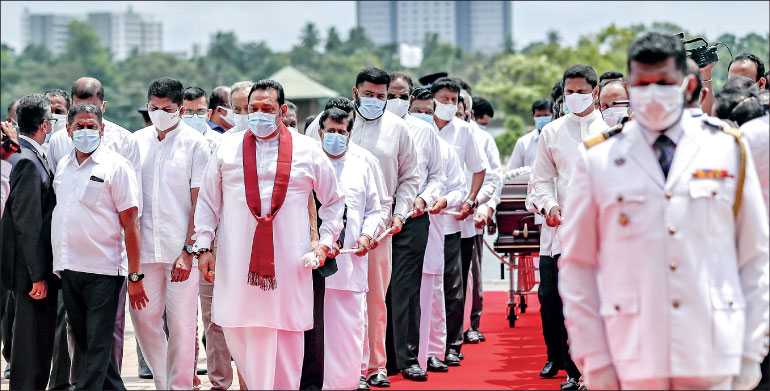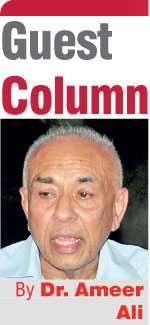Friday Feb 20, 2026
Friday Feb 20, 2026
Wednesday, 3 June 2020 00:10 - - {{hitsCtrl.values.hits}}

Political hypocrisy was exposed a few days ago in the funeral procession of CWC Leader Arumugam Thondaman. Laws governing crowding and social distancing were openly flouted when thousands of Thondaman’s mourners, SLPP VIPs and members of Buddhist clergy were allowed to participate in that procession
Sri Lanka is a multi-ethnic, multi-lingual, and multi-cultural society. Sinhalese, Tamils, Moors, Malays, Burghers and other communities speak different languages with different dialects and follow different religious and cultural traditions. Their looks, mannerisms and lifestyles are different, their tastes are varied, and even expressions of joy and sadness are disparate. 
From the ancient past, although Buddhism remained the running thread, the cultural tapestry of this country has been woven with different colours and designs by multiple communities and cohabiters. No ruler, and not even British imperialists, ever thought of homogenising this paradise of heterogeneity. Even today, foreign tourists flock to Sri Lanka partly because of its rich cultural diversity.
Since very recently however, the idea of ‘one country one law’ has been mooted by an ultra-Buddhist nationalist avant-garde, which is aspiring to restructure the country’s polity, economy and society in their own image of Theravada Buddhism. Representatives from this avant-garde are part of President GR’s “power cartel”, and they are on a mission to homogenise the nation’s diverse cultural landscape. ‘One country one law’ is an aphorism designed to add a veneer of rationality to an otherwise sinister agenda of Buddhist supremacist rule.
After nearly 450 years of Christian domination under three successive Western powers, it was legitimate for Buddhism to reclaim its pre-colonial supremacy in independent Sri Lanka. It was with that objective, the memorable scholar monk Walpola Rahula stamped Sri Lanka as a Buddhist country and warned others not to make a mistake of it. The influential Catholic Action movement led by Buddhist priests from Vidyalankara Pirivena in 1950s and 1960s was also motivated by Walpola’s aspiration.
It was this yearning to bring back Buddhism to its historic status that ultimately saw Buddhism elevated to ‘foremost place’ in the 1972 Colvin Constitution. Although Colvin was a Trotskyite socialist he could not resist the pressure from his ardently Buddhist Prime Minister, Sirimavo Bandaranaike, who, according to Colvin himself, “imposed the 1815 Kandyan Convention on that Constitution”.
However, never in these decades was there any call from any Buddhist leader, including Walpola Rahula to absorb other religious and cultural communities into the Buddhist fold and eliminate the cultural diversity of this nation. Not even JR and his successor presidents entertained that idea.
It was only after the civil war amidst raging anti-Muslim violence spearheaded by mafia-like groups such as BBS, JHU, Sinha Le, Ravana Balaya and a few others, the idea of ‘one law one country’ began to receive currency within a circle of Buddhist supremacists. It became a convenient aphorism to cover preaching of hatred against the Muslim community which, after 1990s was asserting its religious and cultural identity in multiple forms.
In 2019, during the last days of Yahapalanaya regime, when Muslim leaders were squabbling over the issue of amending the Muslim Marriage and Divorce Act of 1951 (MMDA), Rev. Athuraliye Rathana Thera, an unelected Member of Parliament representing JHU and an anti-Muslim campaigner, took the opportunity and moved a Private Bill in the House demanding the abolition of the entire Act. He argued that there should be only one set of laws in one country. Although he did not specify which law that he wanted to promote, Roman Dutch Law, Kandyan Law, or Thesavalamai, his demand for doing away with the so called Sharia Laws governing MMDA was never in doubt.
The same argument of ‘one country one law’ was invoked by President Gotabaya Rajapakse (GR) to justify his stand on cremating Muslim dead bodies caused by COVID-19. On the advice of a health expert from the establishment and contrary to all advice from other epidemiologists from different parts of the world and WHO, GR approved cremating COVID-19 killed Muslims. Several appeals, letters and statements from both local and international leaders and organisations to allow Muslims to bury their dead victims had fallen on deaf years. It was one country one law. Period.
However, the political hypocrisy behind this argument was exposed a few days ago in the funeral procession of CWC Leader Arumugam Thondaman. Laws governing crowding and social distancing were openly flouted when thousands of Thondaman’s mourners, SLPP VIPs and members of Buddhist clergy were allowed to participate in that procession.
Not only was that procession an occasion to pay last respects to a dead leader, but also was one to celebrate the entry of his progeny into CWC politics. The whole event was reduced to a pre-election tamasha by GR-MR regime to win over CWC supporters. The Police remained onlookers. Now, the Public Health Inspectors Union threatens to take legal action against the funeral organisers if anyone from that crowd fell victim to COVID-19. A law has been broken and shouldn’t action be taken under one country one law?
Contrast this incident with another funeral in the Muslim community. A couple of weeks before Thondaman’s death, a renowned Muslim scholar, Dr. Shukri, Director of Naleemiya Institute in Beruwela, passed away. Thousands of his admirers, students and Muslim intellectuals would have attended his funeral had it not been for the rules on crowd restriction. Instead, only his family members participated in the funeral rites. Muslims respected the principle of one country one law while GR-MR regime flouted it.
To the President and his “power cartel”, CWC vote bank is more precious than the death of its leader. It looks that coronavirus had gone on a holiday allowing mourners and celebrities to throng the streets? Why did the Police remain inactive? Were they under special instructions? In summary, there is one country one law with one purpose, i.e., to win the next election at any cost with two-third majority.
(The writer is attached to the School of Business and Governance, Murdoch University, Western Australia.)